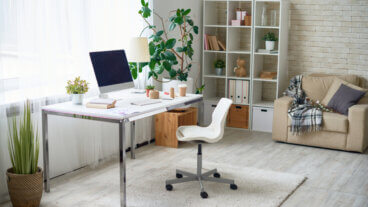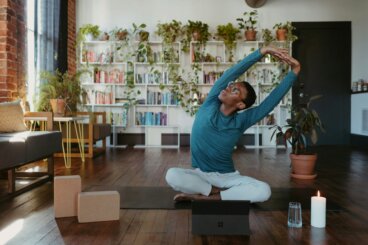How Home Decor Affects Your Emotions
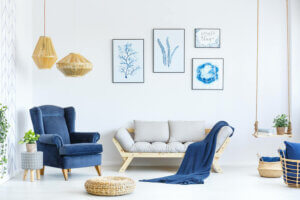
Living in a comfortable home is priceless. There’s nothing worse than not feeling good in your own home. Ultimately, this can affect you on a personal level. In this article, we analyze how home decoration affects your emotions.
Choosing decorative items that suit your personality is essential. Combining resources in a coherent and orderly way will promote wellness. Therefore, your home should be decorated in the best possible way.
Although it may seem strange, a poor relationship between the furniture and colors in rooms can cause anxiety and stress. This is due to not feeling comfortable in your own home, meaning it’s not easy to live there.
How home decoration affects your emotions – untidiness can cause stress
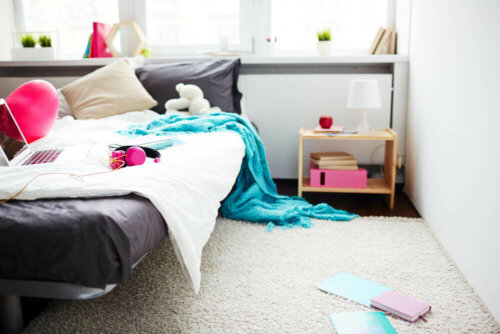
People usually lead hectic lives. Schedules, work, and daily activities mean we’re often away from home. In some cases, this can lead to neglect of decoration and cleaning, which eventually ends up leading to a mess.
If you have children and don’t set a good example for them, they’ll learn habits similar to yours. For this reason, you should be a good role model and try to show them how to clean up and how each person’s personal space should be cared for.
If your home is messy, your life isn’t organized. This means that you aren’t dedicating enough time to achieving well-being. If you’re stressed, then you won’t take enough care of your home. Therefore, it’s important to acknowledge your situation.
Demotivation and stress can be reflected in your home’s messiness.
5 benefits of having an orderly and well-decorated home
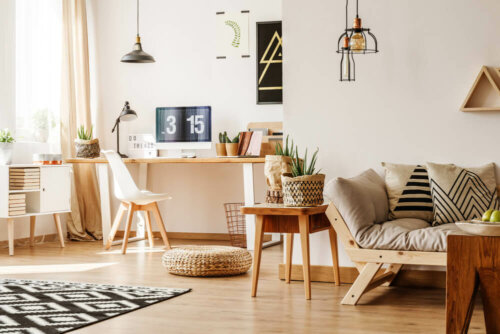
Now that you know the consequences of not having your home well-organized, it’s time to address the benefits that decoration provides, as long as you do it properly. Here are some positive factors:
- As we mentioned above, if order overcomes chaos, you’ll feel better. Getting home and seeing that everything is in place requires daily effort that’s worth it!
- Most problems can arise in the living room. The way you combine your furniture with the colors of the walls is essential. Try to achieve general harmony and dialogue with the decoration. This way, you’ll feel more comfortable.
- Overly striking colors, such as yellow, pink, or red, can cause hyperactivity in your mind. Therefore, it’s advisable to use calmer and neutral colors that can relax you.
- On the other hand, you should make sure your bathrooms are clean and tidy. Daily hygiene is very important. You must make sure that this room is a pleasant place that makes you feel good, where purity is represented through the color white. Also, you should make sure it exudes hygiene and cleanliness.
- The balance between decoration and transparency can help make a room feel spacious. Keep interiors simple. For example, keep a distance between furniture so you have enough space to walk and, don’t overdo it with the use of decorative accessories.
How home decoration affects your emotions – the type of lighting
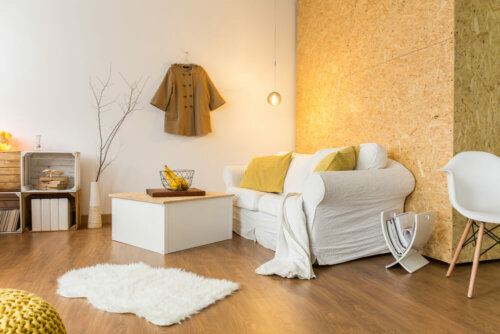
Light directly conditions your mood. You should resort to warm and pleasant light for reading, studying, or to create ambiance in your home. Cool white light is functional that makes people feel tense.
Although we recommend using both types of light, you must know how to decide which one you should choose for each room. In the areas in which you spend more time in or where you rest, you should go for warm light, since it’ll provide you with a greater sense of comfort.
On the other hand, cool white light can be useful in functional spaces, such as the pantry, a storage room, the kitchen, or the bathroom. Warm light should always prevail over white, as it’ll help you feel better!
Choose the right decorative elements
A mistake that people often make is that they add too many decorative elements. In this sense, people tend to use accessories without achieving an aesthetic coherence.
If you want to follow a specific theme or achieve a style, you need to know what resources can be useful to decorate your home in tune with your personality.
Living in a comfortable home is priceless. There’s nothing worse than not feeling good in your own home. Ultimately, this can affect you on a personal level. In this article, we analyze how home decoration affects your emotions.
Choosing decorative items that suit your personality is essential. Combining resources in a coherent and orderly way will promote wellness. Therefore, your home should be decorated in the best possible way.
Although it may seem strange, a poor relationship between the furniture and colors in rooms can cause anxiety and stress. This is due to not feeling comfortable in your own home, meaning it’s not easy to live there.
How home decoration affects your emotions – untidiness can cause stress

People usually lead hectic lives. Schedules, work, and daily activities mean we’re often away from home. In some cases, this can lead to neglect of decoration and cleaning, which eventually ends up leading to a mess.
If you have children and don’t set a good example for them, they’ll learn habits similar to yours. For this reason, you should be a good role model and try to show them how to clean up and how each person’s personal space should be cared for.
If your home is messy, your life isn’t organized. This means that you aren’t dedicating enough time to achieving well-being. If you’re stressed, then you won’t take enough care of your home. Therefore, it’s important to acknowledge your situation.
Demotivation and stress can be reflected in your home’s messiness.
5 benefits of having an orderly and well-decorated home

Now that you know the consequences of not having your home well-organized, it’s time to address the benefits that decoration provides, as long as you do it properly. Here are some positive factors:
- As we mentioned above, if order overcomes chaos, you’ll feel better. Getting home and seeing that everything is in place requires daily effort that’s worth it!
- Most problems can arise in the living room. The way you combine your furniture with the colors of the walls is essential. Try to achieve general harmony and dialogue with the decoration. This way, you’ll feel more comfortable.
- Overly striking colors, such as yellow, pink, or red, can cause hyperactivity in your mind. Therefore, it’s advisable to use calmer and neutral colors that can relax you.
- On the other hand, you should make sure your bathrooms are clean and tidy. Daily hygiene is very important. You must make sure that this room is a pleasant place that makes you feel good, where purity is represented through the color white. Also, you should make sure it exudes hygiene and cleanliness.
- The balance between decoration and transparency can help make a room feel spacious. Keep interiors simple. For example, keep a distance between furniture so you have enough space to walk and, don’t overdo it with the use of decorative accessories.
How home decoration affects your emotions – the type of lighting

Light directly conditions your mood. You should resort to warm and pleasant light for reading, studying, or to create ambiance in your home. Cool white light is functional that makes people feel tense.
Although we recommend using both types of light, you must know how to decide which one you should choose for each room. In the areas in which you spend more time in or where you rest, you should go for warm light, since it’ll provide you with a greater sense of comfort.
On the other hand, cool white light can be useful in functional spaces, such as the pantry, a storage room, the kitchen, or the bathroom. Warm light should always prevail over white, as it’ll help you feel better!
Choose the right decorative elements
A mistake that people often make is that they add too many decorative elements. In this sense, people tend to use accessories without achieving an aesthetic coherence.
If you want to follow a specific theme or achieve a style, you need to know what resources can be useful to decorate your home in tune with your personality.
All cited sources were thoroughly reviewed by our team to ensure their quality, reliability, currency, and validity. The bibliography of this article was considered reliable and of academic or scientific accuracy.
- Quan, Diana: El paraíso es tu casa: un manual para ser feliz de puertas para adentro, Barcelona, Sipan Barcelona Network, 2017.
